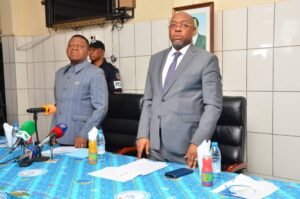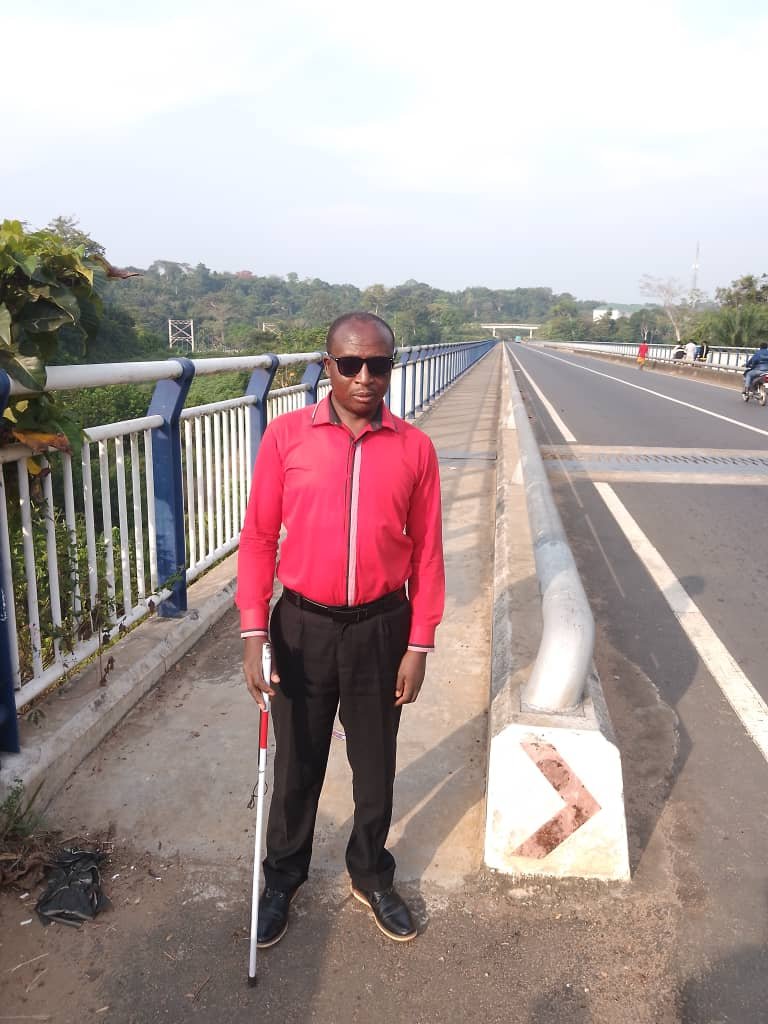“Segregating us into one polling station can create stigma, especially if results there don’t favor certain candidates.
By Princeley Njukang, Cameroon
Akoh Henry, visually impaired, has been following preparations for the October 12, 2025 presidential election with rapt attention. A musician, disability rights advocate, and father, he tells DNA that the election is crucial, not just for his future, but for the future of his children, whom he works tirelessly to give the best life. Yet he fears that when he casts his vote, his choice might not be respected.
“I went to this polling station, and one man asked me whom I wanted to vote. I told him the candidate I thought was best, but as a blind man, I cannot know if my choice was respected,” he says, recounting experiences in previous elections.
The Electoral Code of Cameroon states that voting shall be via secret ballots. It makes voting a secret act, where whom one votes for is solely known to the individual. Yet for persons with disabilities, this secrecy remains farfetched.
Disabled Voters Fear: Will My Vote Count?
Although Article 105 allows any elector whose physical state makes them unable to vote independently to seek assistance from a trusted person, Akoh believes the provision fails to account for a context where vote buying and dishonesty are prevalent.
“You will be asking someone to assist you, not knowing that they see you only as a vehicle to make their favorite candidate win,” he says. In 2022, SightSavers documented several instances of degrading treatment towards PWDs during elections, highlighting systemic barriers that hinder their full participation.
For years, persons with disabilities have decried the fact that the electoral process in Cameroon is largely non-inclusive, preventing them from exercising their political rights. As the countdown to election day narrows, these calls have intensified, especially in a context where the presidential election is predicted to be heavily contested.
“The electoral process in Cameroon has never been inclusive,” Judith Eyong, a mobility-impaired voter who has participated in several elections, says. She adds that it is unacceptable that in 2025, polling units are still kept in inaccessible areas, with no efforts made to provide ramps to ease the movement of those on wheelchairs.
“The list of voters should not be right up. It should be down in order for persons on wheelchairs and short persons to have access,” she recommends. PWDs like her think that inaccessible practices continue because they are not consulted.
Government Promises vs. PWD Reality
In June 2025, the Minister of Social Affairs, Pauline Irène Nguene, said the inclusion of PWDs in the electoral process is paramount. “Nothing for us without us,” she said, parroting a well-known line within the disability community.
But PWDs in the South West Region say they have been largely sidelined or only called in as a way to deceive the international community that inclusion is well and alive.
“I’m only working here because I complained that we’re excluded, so they said okay, you come and help us mobilize them,” one of the PWDs, who refused to be named for the sake of his work with Elections Cameroon, says. “If they meant real business, we would have been involved from the start, so we get to say what works and what doesn’t for us,” he adds.
ELECAM has assured that it has taken necessary measures to ensure that PWDs can participate on an equal basis with others. In May, ELECAM board member Tambe Tiku Christopher told the press that elections are a major component of democracy. He added that given Cameroon’s inclusion drive, as pledged in the Constitution and other national and international laws such as the Convention on the Rights of PWDs, every Cameroonian voice “deserves to be heard regardless of religion, gender or ability. This is not merely a procedural requirement. But a moral imperative that defines the character of our democracy.”
ELECAM has partnered with several United Nations bodies to devise an inclusive national strategy for voter mobilisation. While some PWD leaders have been involved, most in the South West feel the selection of participants is political and fails to include those who can speak on the lived realities of PWDs.
“You cannot just pick the same persons from the same regions and put them to speak for all of us. By the way, do these people not know that one person with a disability doesn’t master the full scale of disabilities?” a female PWD leader, who preferred anonymity, says.
During the 2018 presidential election, ELECAM provided ballots in Braille and used sign language interpreters to reach voters with hearing impairments. Chairperson Dr. Enoh Abrahams says similar measures have been put in place this year. Other measures, such as dedicated polling units for PWDs, have also been touted.

Credit: ELECAM
PWD Leaders say these steps are welcome but insufficient.
“Segregating us into one polling station can create stigma, especially if results there don’t favor certain candidates. And as for Braille ballots, literacy among the visually impaired in Cameroon is less than 5%. How do you expect people to use them?” Peter Tonain, president of Hope Social Union for the Visual Impaired, asks.
Low Registration and Disillusionment Threaten Participation
As of December 2024, only 33,985 PWDs were officially enrolled in the electoral register, a small fraction given that PWDs are estimated to make up 15% of Cameroon’s population. In concrete numbers, the Ministry of Social Affairs says there are over 3.48 million Cameroonians living with disabilities, with an estimated one million of voting age.
According to Prof. Charley R. Nyugap, leader of the Disability Rehabilitation and Live Animation Organization, this low registration is largely due to disillusionment. He questions why PWDs should continue registering when presidential candidates ignore their inclusion in manifestos.
“We expect that the candidates should have been talking about the agenda they have for persons with disabilities, but not one of them is saying anything,” he reveals.
For many Cameroonians, elections bring hope for change. Prof. Charley says this hope has largely eluded PWDs, who are unsure whether a change in leadership will mean anything positive.
“A president can only be held to task based on the manifesto which he presented to electorates. That is the contract that binds them,” he says.
For Adel Nguzana, a first-time voter with visual impairment, candidates need to prioritize issues that matter to PWDs. “We need accessible public infrastructure and transportation, inclusive education and employment opportunities, as well as access to healthcare and the full respect of our rights,” she says. While she is excited to vote for the first time, the uncertainty of how inclusive the process will be leaves her panicking.
